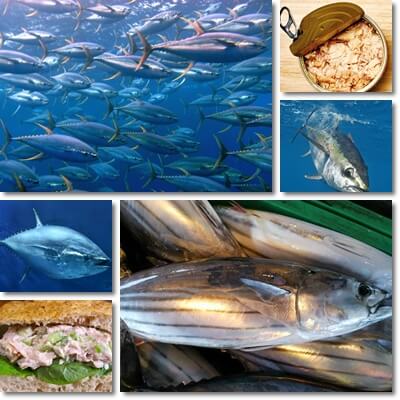Tuna is a fish with many beneficial properties and an overall good food to eat in moderate amounts. It is an important source of a special Omega-3 fatty acid that protects nerve cells from damage and enhances memory and learning. Eating tuna is especially good for the heart because it helps lower cholesterol and triglyceride levels. Even better, it promotes strong bones and boosts immunity.
At the same time, tuna is the fish that accumulates the most heavy metals, potentially causing infertility and can be a source of intestinal parasites.
What are the side effects of eating tuna?
What are the dangers of eating too much tuna? This particular fish tends to accumulate heavy metals which makes it detrimental for your health when eaten in higher amounts than recommended, especially every day. And although it is a saltwater fish, it may be a source of worms and intestinal parasites. Tuna is also a source of histamine and can trigger allergic reactions in certain people.

Source of intestinal parasites
The type of intestinal parasites found in tuna and other saltwater fish do not directly infect people, but rather end up digested with the fish and then die, forming cysts that trigger immune system responses.
And these immune system responses can potentially escalate into severe allergic reactions, including anaphylactic shock.
Can cause allergic reactions
Fish like tuna produce histamine as they spoil. Histamine is also produced naturally in the body by the immune system in allergic reactions and its role is to create inflammation. Ingestion of spoilt fish, either raw in sushi or cooked can occasionally cause an accumulation of histamine and subsequent inflammatory responses of the likes of allergy symptoms: redness, rash, fast heart rate, nausea, headaches, stinging sensation in the mouth, swelling of the tongue, breathing difficulties. Mackerel is another fish that produces similar side effects to tuna.
Tuna mercury content is high
Tuna is a fish-eating fish. This means that it eats smaller fish that eat even smaller fish that eat invertebrates or plankton. And the bigger fish-eating fish like tuna accumulate whatever the fish lower on the food chain consume, including heavy metals like organic mercury.
Eating too much tuna, especially varieties known to accumulate the most mercury such as albacore tuna, bigger and older tuna or tuna captured from polluted waters can cause problems for consumers over time due to their high mercury content as the organic compound accumulates in the body. There are many health dangers to mercury contamination.
Mercury accumulation in the body has been linked to developmental problems in children, especially intellectual disability of varying degrees, and infertility in women.
Degenerative diseases of the nervous system like multiple sclerosis or dementia are also suspected to be caused by heavy metals contamination, including from dietary sources.

Other side effects of eating tuna
Below is a complete list of potential side effects, health risks and dangers of eating too much tuna, eating tuna too frequently, or eating the fish raw or undercooked:
- Allergic reactions, a rare side effect.
- Food poisoning, if the fish if spoiled or improperly prepared.
- Intestinal parasites infestation, a rare side effect with tuna.
- Mercury accumulation causing health issues over time, including: infertility in women, intellectual disability in children, nerve problems and degenerative nervous system diseases etc.
- Acid reflux in those with existing gastroesophageal reflux. Acid reflux from eating tuna is caused primarily by the oils added to the tuna to preserve it such as in canned tuna, but it’s common for the fish itself too to cause acid reflux due to being an oily fish variety.
- Nausea, loose stools, diarrhea, headaches.
- Sleepiness or drowsiness after eating tuna have been reported. Potential causes: B vitamins, amino acids stimulating sleep, food sensitivity, allergy symptom.
Can You Eat Tuna While Pregnant?
Tuna is known for accumulating methylmercury, an organic form of the heavy metal, in its meat from other fish it eats. Although commercially available tuna is safe to eat in moderation, as part of a varied and balanced diet, mercury and other heavy metals do accumulate in the human body as they do in tuna. It may take up to a year for the human body to naturally eliminate the contaminants.
As a result, women who are looking to conceive, are pregnant or are suffering from fertility problems are advised to avoid eating tuna too frequently or in too large amounts. The albacore tuna, which is also threatened by extinction, is said to accumulate the most methylmercury. Larger, older tuna species or fish caught from polluted waters contain the most heavy metals as well.
What are the health benefits of eating tuna?
Of course, there are numerous health benefits to eating tuna in moderate amounts.
- Provides important amounts of DHA Omega-3 for brain and cardiovascular health.
- Protects nerve cells and enhances learning and memory.
- Promotes brain development in babies in the womb.
- Helps lower LDL cholesterol and triglyceride levels.
- Boosts immunity thanks to its vitamin D and zinc content.
- Boasts anti-inflammatory and antioxidant properties.
- Has vitamin D, phosphorus and magnesium for strong bones.
- Rich source of protein for building muscle and losing weight.
- Helps regulate sleep, appetite and may improve mood.
- Promotes skin and hair health.
- Source of B vitamins for elevated energy levels.
- Tuna fish have iron, vitamin A, choline and potassium.
7 Tips on how to eat tuna safely
Below are 7 important recommendations from nutrition experts on how to eat tuna safely:
- If you are looking to become pregnant in the next year, are having fertility problems or are pregnant, avoid eating tuna or replace it with other fish in your diet.
- If possible, choose smaller, younger fish that have not had the time to accumulate excessive amounts of heavy metals and avoid species known to grow to significant sizes.
- Choose fattier tuna. Research shows fish with more fat may accumulate less heavy metals, making them safer to eat. Read labels of different products available and compare nutritional information.
- Avoid tuna labeled ‘white tuna’ or ‘light tuna’ that is generally light in color, whitish. It is typically albacore tuna which is not only on the verge of extinction, but has also been found to contain the most mercury. Check the label.
- Darker-colored tuna is said to be safer for consumption as are smaller species like skipjack tuna.
- Limit consumption to one or two cans of tuna per week and take regular, lengthy breaks from eating tuna to allow your body to detoxify. Choose other fish varieties or krill oil to get nutrients like Omega-3 from.
- If possible, check the label for information on where the tuna is coming from to see if it originates from clean, unpolluted waters.
